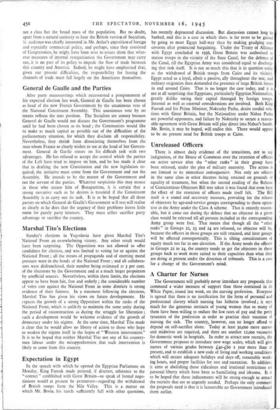Expectation in Egypt
In the speech with which he opened the Egyptian Parliament on Monday, King Farouk made pointed, if discreet, reference to the " contact " established with Great Britain—to speak of formal nego- tiations would at present be premature—regarding the withdrawal of British troops from the Nile Valley. This is a_ matter, on which Mr. Bevin. his hands sufficiently full with other questions,
has recently deprecated discussion. But discussion cannot long be burked, and this is a case in which there is far more to be gained by going to meet Egypt half-way then by making grudging con- cessions after protracted bargaining. Under the Treaty of Alliance with Egypt concluded in 1936, Great Britain was authorised to station troops in the vicinity of the Suez Canal, for the defence of the Canal, till the Egyptian Army was considered equal to discharg- ing that task itself. It is not so much this that is in question today as the withdrawal of British troops from Cairo and its vicinity. Egypt acted as a loyal, albeit a passive, ally throughout the war, and military exigencies then demanded the presence of large British forces in and around Cairo. That is no longer the case today, and it is not at all surprising that Egyptians, particularly Egyptian Nationalists, greatly dislike seeing their capital thronged by foreign troops. Internal as well as external considerations are involved. Both King Farouk and his Prime Minister, Nokrashy Pasha, desire cordial rela- tions with Great Britain, but the Nationalists under Nahas Pasha are powerful opponents, and failure by Nokrashy to secure a reason- able agreement with Great Britain will play direct into Nahas's hands. Mr. Bevin, it may be hoped, will realise this. There would appear to be no present need for British troops at Cairo.






























 Previous page
Previous page